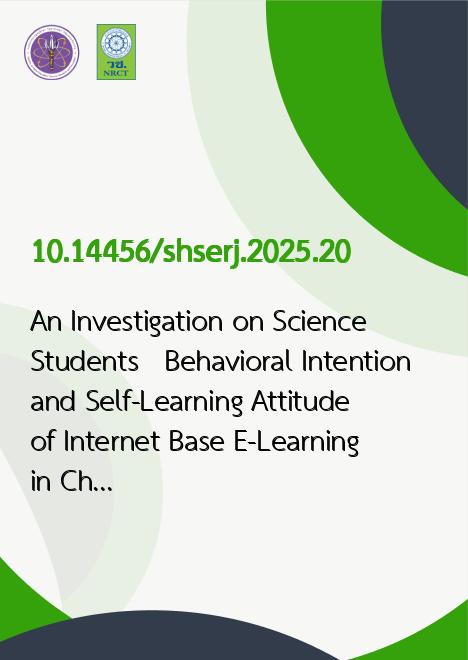
|
An Investigation on Science Students Behavioral Intention and Self-Learning Attitude of Internet Base E-Learning in Chengdu, China |
|---|---|
| รหัสดีโอไอ | |
| Creator | Wang Xiang |
| Title | An Investigation on Science Students Behavioral Intention and Self-Learning Attitude of Internet Base E-Learning in Chengdu, China |
| Publisher | Assumption University Press |
| Publication Year | 2568 |
| Journal Title | The Scholar: Human Sciences |
| Journal Vol. | 17 |
| Journal No. | 1 |
| Page no. | 210-219 |
| Keyword | Perceived Usefulness, Perceived Ease of Use, Perceived Enjoyment, Self-Learning Attitude, Behavioral Intention |
| URL Website | http://www.assumptionjournal.au.edu/index.php/Scholar/article/view/7853 |
| Website title | The Scholar: Human Sciences |
| ISSN | 2586-9388 |
| Abstract | Purpose: This study investigates the factors influencing the behavioral intention and attitude toward self-learning among science students in Chengdu, China, including perceived usefulness, perceived ease of use, perceived enjoyment, self-learning attitude, behavioral intention, system quality, information quality, and service quality. Research design, data, and Methodology: A total of 500 students from the first to third year in the science program participated in this study. A questionnaire was meticulously designed, investigated, and subjected to statistical analysis. The sample selection utilized judgmental, quota, and convenience sampling techniques. Prior to data collection, the index of item-objective congruence and the Cronbach's Alpha test were conducted to ensure the instrument's validity and reliability. Subsequent data analysis employed confirmatory factor analysis and structural equation modeling techniques. Results: The findings revealed that system quality and information quality significantly influence percived usefulness. Perceived ease of use and perceived usefulness have a significant influence on self-learning attitude. Perceived ease of use has a significant influence on perceived usefulness and perceived enjoyment. Perceived usefulness significantly influences behavioral intention. In contrast, service quality has no significant influence on perceived usefulness. Conclusions: The study's findings unveiled important insights, particularly regarding the impact of perceived usefulness on the behavioral intention to engage in self-learning. |
